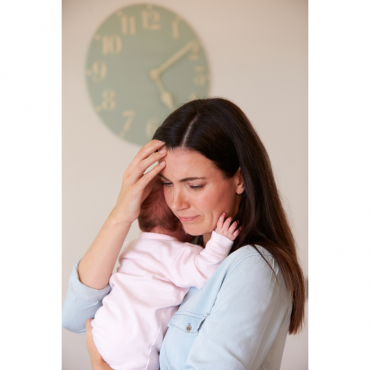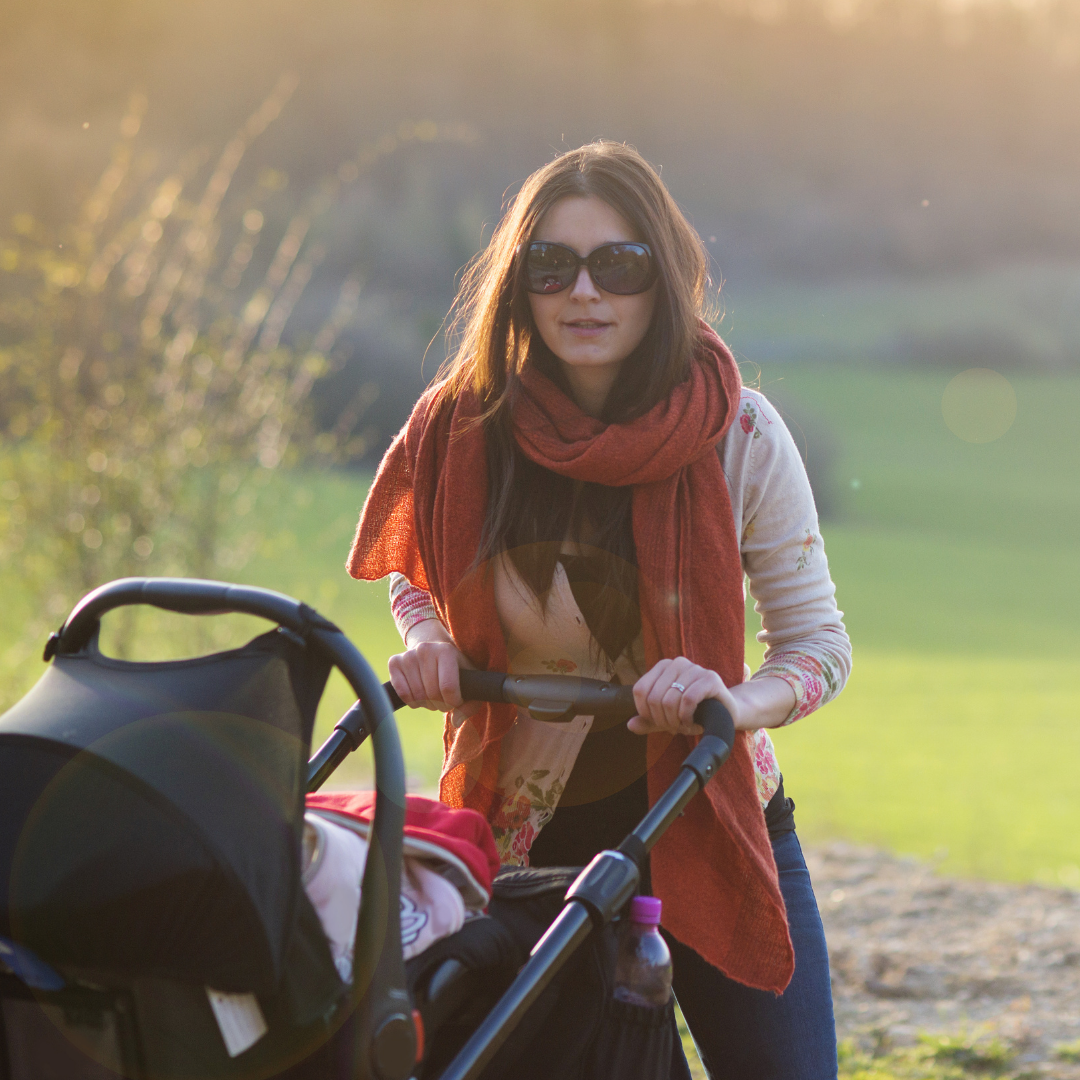The beginning of May is Maternal Mental Health week, organised by The Perinatal Mental Health Partnership. Motherhood is hard at anytime but over the last year, Covid 19 has brought some unique issues for all mums. Dr Lindsay McMillan, Clinical Psychologist and mum of three little ones joins us to talk about how important it is that we pay attention to our own emotional wellbeing as mums.
If you are struggling with your mental health in your pregnancy or as a mum of a baby or toddler, you are not alone
1 in 4 women experience mental health difficulties in the perinatal period, that is the time of pregnancy and the first year of baby’s life. Pre- or post-natal depression, anxiety (including generalised or social anxiety, panic, OCD) and PTSD are all common disorders which may be diagnosed (and less commonly postpartum psychosis). But it is important to remember that everyone’s emotional wellbeing fluctuates and it is really very common for mums of little ones at any stage to experience increased worry, intrusive thoughts, rage and anger, feeling overwhelmed or numbed out, guilt and shame, sensitivity to touch or noise, difficulties in relationships with their children or partner, feeling isolated or just utterly exhausted and burnt out, to name just a few areas.

Motherhood is a time of huge change. You may have a good idea of what has triggered difficulties in your mood, thoughts or feelings but sometimes it can just feel like you are ‘failing’…. You are not!
You may be able to pinpoint events in your journey to becoming or being a mum which have been distressing or stressful for you, for example fertility problems, losses and bereavements, health difficulties, birth trauma, other traumatic events or perhaps family relationship difficulties. It’s also really normal for mums to find the adjustment to their new lives, roles and identity as well as the ongoing daily demands of motherhood tricky. Comparison with other mothers on social media or friends who seem to ‘have it all together’ is so easy to do. But remember that alongside the joy and happiness motherhood can bring comes struggle and pain for everyone at times, even if this is not always visible to others.
It’s okay to feel disappointed, sad and a sense of loss for those important experiences which have been missed or denied.
First time mother or not, Covid 19 has changed mum life for everyone and has had a significant impact on maternal mental health
Often we experience difficulties when there is a gap between what we imagined motherhood to be like and the reality of our experience. For example, we may not have had the birth experience we so wanted, not been able to get pregnant as easily as we expected, not had a baby of a preferred gender, been surprised by having twins or multiples, had to spend time in the NICU or not been able to feed our baby in the way we wanted.
Additionally, the lockdowns and restrictions have had a unique impact on the experiences of becoming and being a mum; from partners not being allowed during scans, restrictions in hospitals, not being able to attend baby classes, not having family around for practical and emotional support to the social aspects of meeting up with fellow mums on maternity leave. It’s okay to feel disappointed, sad and a sense of loss for those important experiences which have been missed or denied.
And now as restrictions are lifting, there are new adjustments to navigate. When being locked away at home with your new baby is all you have known as a mum, it may feel strange, scary or anxiety provoking to be in closer physical proximity to others, go out to baby/toddler classes, meet new mums or for other people to hold your child. Nap and feeding routines may be disrupted as you get out and about more, and new challenges have to be faced such as ‘where can I feed my baby when I am out?’ or ‘will my toddler nap properly if we aren’t at home?’.
If new situations feel overwhelming, try to acknowledge these feelings with kindness. If you would usually tell yourself you ‘should’ be fine, instead try ‘of course I feel like this, we’ve not done this before, this is new and hard’. And there’s no rush to ’get back out there’ – take it a pace you feel comfortable with. Plus remember, every other mum will probably be feeling similar to you, even if they don’t show it! It’s all new to everyone and there’s no right or wrong way to feel.

There are lots of ways you can get help and support with how you are feeling
Reaching out to others to talk can feel daunting but if you can speak to someone you trust and feel safe with about what you are finding difficult, you may well hear the words ‘oh yes, I’ve felt like that too’. Mum & You’s collection of stories about ‘being mum during the pandemic’ can help show you are not alone if you found the last year difficult. Writing in a journal can help acknowledge and start to process thoughts and feelings. And there is lots of supportive information online for mums’ mental health such as professionals’ accounts on Instagram, podcasts, blogs and organisations. We’ve listed a few below.
It can be really hard to prioritise yourself and practice the elusive ‘self-care’ as a busy mum, but it really is important that you take some time to look after yourself no matter how small the action is. Just as babies and toddlers need to be nurtured, so do new mums. Even in the phases when practical acts of self-care seem impossible to do, try to offer kind and compassionate words to yourself (rather than being self-critical) and in the throes of sleep deprivation, it’s important to make time to rest whenever it is possible.
If difficulties with your mood persist or you feel like you would like to speak to someone about how you are feeling, talking to your GP is often a helpful first step to start your own, personal journey to recovery. You may discuss if medication is appropriate or helpful as well as the local services available who can offer practical support or talking therapy. If you are seeking private psychological therapy, many psychologists and therapists offer sessions at times to fit around family life, including online Zoom calls.

A practical exercise to help manage overwhelm
It is much easier to have control over our behaviour and actions than it is our thoughts and emotions. When we feel the things that are happening to us or around us are out of our control, reminding ourselves of our choice over actions which are within our control can help steady us in a moment of overwhelm.
I shall leave you here with a quick exercise, taken from Acceptance and Commitment Therapy (Dr Russ Harris) for when you feel in the midst of an ‘emotional storm’:
A: Acknowledge how you are feeling, with kindness
‘I’m noticing anxiety and worry about going to our first baby class’… of course I feel worried, we’ve not been out together like this before’.
‘Here is sadness again, when I think about baby never meeting their grandparent’… this is so hard’.
‘I’m feeling so irritated and angry… no wonder, I’ve been on my own all day with no other adults to talk to and I haven’t been able to do what I needed to’
C: Connect with your body – take some small, physical action to bring you back into your body and the present moment. Push your feet into the floor, press your fingertips together, gently move your eyes from side to side, stretch, rub your hands or arms, take a deep breath if that feels okay to do so.
E: Engage with the world around you – use your senses to notice what is around you in the room, outside into nature or whilst drinking a warm drink. What can you see, hear, touch, smell and taste?
Need some support? A list of helpful organisations…
General support lines for mums pulled together by Mum & You
Perinatal Mental Health Partnership
Make Birth Better (Birth Trauma Support)
PANDAs (PND Awareness and Support)
Motherdom (Mental Health platform for parents of little ones)
Blog by Evie Canavan – Support when mums need it most – Perinatal Mental Health Support during COVID-19 and beyond

Dr Lindsay McMillan is a Clinical Psychologist alongside being mum to three young children. In her private practice, Lindsay supports parents with their own mental health and emotional wellbeing via 1:1 therapy. Areas of work include anxiety, low mood, depression, stress, self-esteem and confidence, overwhelming emotions such as anger, relationship difficulties, trauma and PTSD, childhood trauma and attachment. She holds a specialist interest in Parental Gender Disappointment – when baby is not the sex, or gender, very much hoped for.
More information can be found on her website www.mcmillanpsychology.com
You can also find her on Instagram and Facebook @mcmillanpsychology and @theGDpsychologist





No Comments